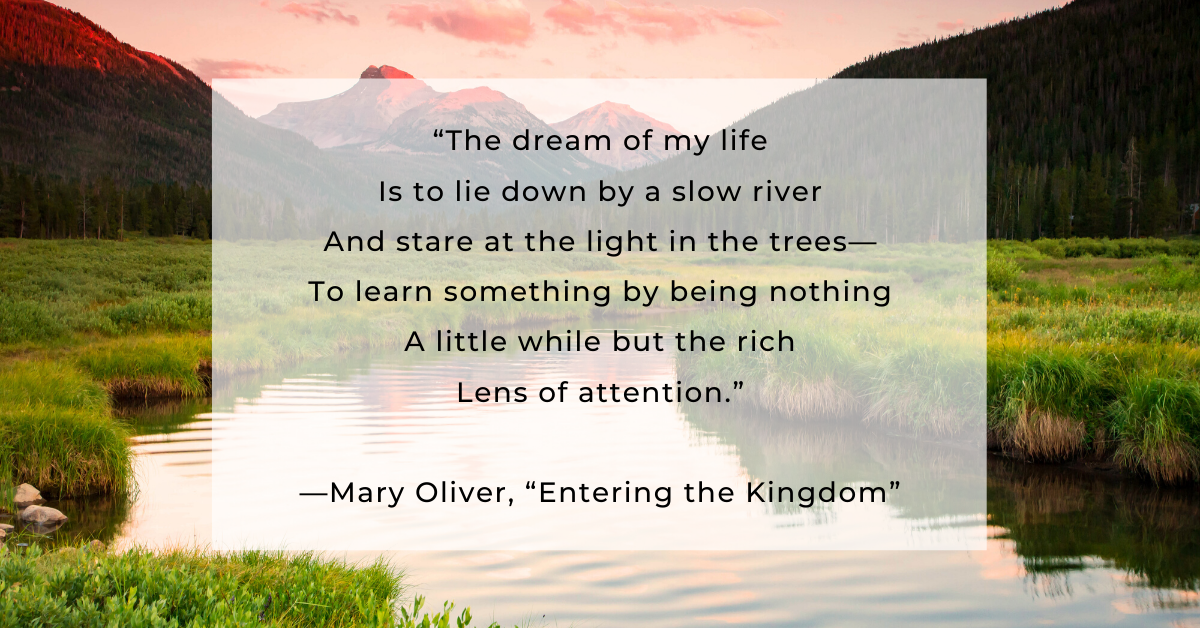I have loved Mary Oliver’s poetry since college. Her poems speak to me in deep and surprising ways, particularly the stanza above. It came to mind this morning and brought the fragrance of rivers and forests along with a sense of calm and hope for our world during this perilous time.
Oliver’s words invite a slowing down and expanding of awareness. When I do this, it helps me find meaning in all I have been thinking, feeling, and sensing; and all I am hearing from others. Her words inspire me to practice staying as fully present as I can to the courage, commitment, suffering, and grief of others. But is simply staying present enough?
In recent weeks, I have been precisely aware of how we are—individually and collectively—creating social fields for good or ill. Both through online media, through virtual meetings, and in person, albeit six feet away, these invisible and hard to prove fields are affecting our organizations, communities, countries, and world. By “field” I mean all the forces that affect how we treat ourselves and one another—the combination of all the conversations, discourses in writing and media, interpretation of events, and social norms along with our multiplying biases and presences, (i.e., what each of us is feeling, thinking, saying, and doing.)
Although these fields are always in play, we do not usually notice them until they have an impact, like the wind bending the branches of a tree. Although invisible to us individually, collectively these forces can now have life and death consequences. Every moment we are contributing to and influencing social fields to become either more harmonious or more discordant. Here are two examples.
A headline on a news website yells: “Coronavirus is dividing blue cities from their red states.” The article went on to explain that Democratic mayors in “red states” are attempting to protect people by asking them to stay at home and respect “social distancing.” But the Republican governors in these states are not helping the Mayors when they do not provide consistent guidelines for their states. Mayors and governors are not working in concert to protect their residents. If this pattern continues to play out, I believe it is quite possible that the music we are collectively singing will get even more discordant, even dangerous over time. The divides in which we began this crisis might get deeper as the crisis continues. When we generate discord, that which divides us will only increase during this time.
And, yet, at the same time in a hospital in Washington State, a nurse uses her personal phone to allow a daughter to say goodbye to her mother via FaceTime. Because she was dying from Covid-19, her children could not be with her and they did not want her to die alone. The nurses stayed with her until she did. This story highlights the harmonies that speak to our hearts and promise that we will be better at the end of this difficult period. We can be kind and compassionate in ways we might not have thought possible in the past. And that is the point. The past can stay in the past and we can create a new social field of belonging and caring today.
Although we don’t have bullhorns of our politicians or the exposure of our journalists, each of us can, in our thoughts and interactions, make a difference. How might we slow down and stare at the light in the trees? How might we learn something by offering nothing more for a little while than being the rich lens of attention?
When I pause and look out my window at the trees with rain cascading down the leaves and trunks, I notice colors and shapes. I also notice the space surrounding the trees. This expands a sense of space around and in me. I take a deep breath.
In this remembered spaciousness, perhaps something other than fear, blame, and grief can find root. We can plant seeds for a future field in which we listen to one another, work hard to understand each other, especially when we disagree; and hold heartfelt wishes for everyone’s health and well-being.
Now and then, we can learn something by being nothing but a rich lens of attention.
With heartfelt wishes for your health and well-being,
Mary
P.S. If poetry inspires you, as it does me, I invite you to read the March 25 post The Still Point based on a phrase from T.S. Eliot’s “Four Quartets”.


Mary dear, it is my fervent dream that this opportunity to stare at the light through the trees will lead us to this more open, more unified way of being with each other that you describe. Thank you for eloquent hope and description. XOXO
The good treatment and qualities that we want from others have to be first of all within us. There is no better teacher then our Lord Jesus Christ. When it comes to picking up our cross to be able to follow Him and thus acquire the good things from each other, it seems to very quickly become too heavy of a burden. We want the good without leaving the bad. Maybe if we use a magnifying glass instead of just a lens, we can see alot better and rid ourselves of what we know is not good within us so that there is no interference in being good to each other and we are better able to treat each other with the respect and love we so much are craving for. Too bad that most of us would not use the magnifying glass because it would show us our flaws, faults and weaknesses that we all don’t really want to see and are huge contributors to why we all treat each other the way we do. All this self denial just doesn’t help, does it?